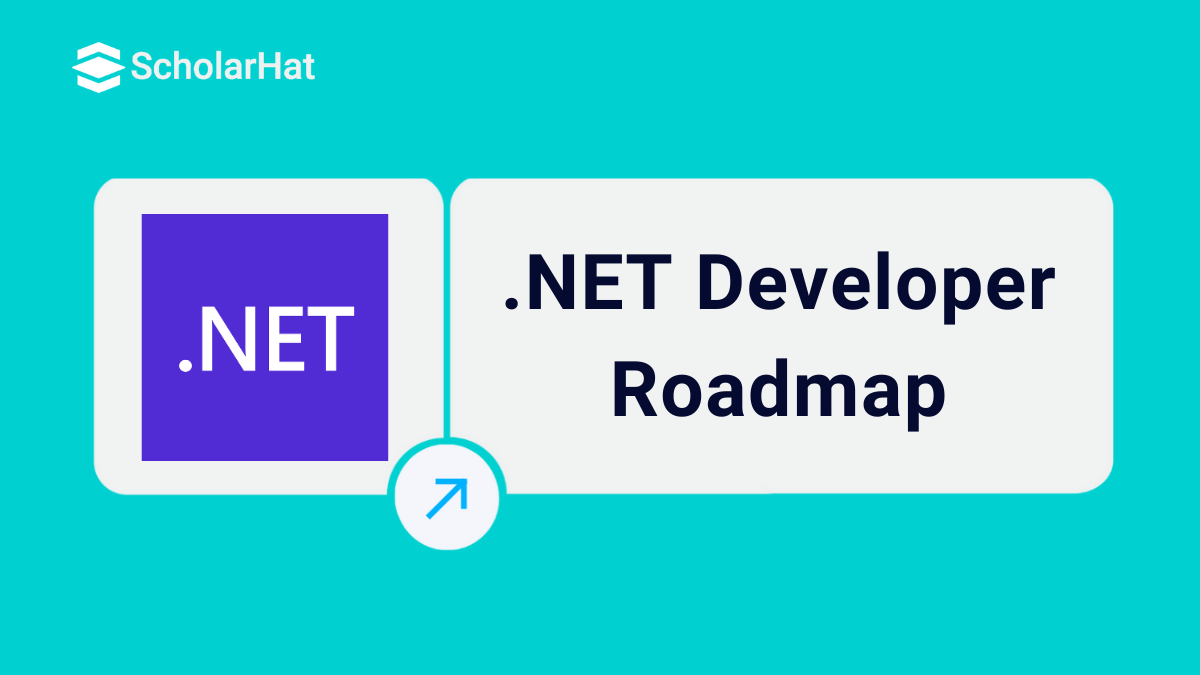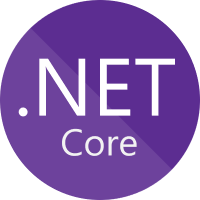18
Apr.NET Developer Roadmap - Career Path for .Net Developer
.NET Developer Roadmap in 2025: An Overview
.NET is an ever-evolving framework developed by Microsoft. This powerful open-source development platform has been driving the software industry for years. In this .NET tutorial, we will dive into the details of the journey of becoming a .NET developer in this era of AI and ML.
What is .NET?
.NET is an open-source versatile software development framework introduced by Microsoft in 2002. The motto behind it was to create applications for Windows only. However, with time Microsoft launched newer and updated versions of .NET like .NET Core which enables adaptability with different platforms like Linux, macOS, etc. It includes various tools, frameworks, and languages that allow .NET developers to create web, desktop, and mobile apps. It provides a runtime environment and a collection of libraries for building, deploying, and running applications on Windows.
What Does a .NET Developer Do?
A .Net developer is primarily responsible for designing, developing, and implementing intelligent software applications. They focus on various aspects of web development, mobile application development, Machine Learning (ML), Artificial Intelligence (AI), and cloud applications.
.NET Developer Job Roles and Responsibilities
- Using .NET infrastructure to create software solutions to meet the customer's requirements
- Collaborating with internal teams to produce software architecture and design
- Organizing meetings with the clients to discuss the project details
- Writing code aligning with the customer's brief and requirements
- Preparing and maintaining code for various .NET applications and resolving defects in systems
- Ensuring error-free code, adhering to the coding and development best practices
- Integrating data storage systems and maintaining code quality
- Creating architecture and user interfaces for .NET applications
- Innovating and building high-quality software solutions using the versatility of .NET platform
- Ensuring the output applications are visually appealing, engaging, and user-friendly
- Testing the software outputs to ensure they are in excellent working condition
- Keeping up to date with coding and technological changes that impact the work
- Collaborating with colleagues to facilitate the creation of large and complex developments
- Developing documentation using the software development lifecycle (SDLC)
Read More - Dot Net Interview Questions
How long does it take to become a .NET developer?
We'll see some factors that can decide this:
- Prior Programming Experience: If you already have experience with programming languages like C#, Java, or Python, transitioning to .NET development may be smoother for you.
- Learning Resources: Access to high-quality learning resources such as online tutorials, documentation, books, video courses, and interactive platforms like ScholarHat can expedite your learning journey.
- Practice and Hands-On Experience: Building real-world projects, practicing coding exercises, and participating in coding challenges, contribute to gaining practical experience.
- Depth of Knowledge: Becoming proficient in .NET development involves mastering various aspects of the framework, including web development with ASP.NET, desktop application development with WinForms or WPF, database integration with Entity Framework, cloud development with Azure, and more. Determine your areas of interest and focus on acquiring in-depth knowledge and expertise in those domains.
- Continuous Learning and Growth: Technology is constantly evolving, and staying updated with the latest trends, best practices, and advancements in the .NET ecosystem is crucial for long-term success as a developer.
There's a need to concentrate on consistent learning, practical application of concepts, and continuous improvement to achieve your goals as a .NET developer.
How to Become a .NET Developer?
- Understand the Basics of Programming: Start by learning the fundamentals of programming languages such as C#, which is widely used in .NET development. Understand concepts like variables, data types, control structures, functions, and object-oriented programming (OOP) principles.
- Learn .NET Fundamentals: Familiarize yourself with the .NET framework, including its architecture, components, core functionalities, Common Language Runtime (CLR), Base Class Library (BCL), and concepts like assemblies, namespaces, and types.
- Choose a Learning Path: Determine your area of interest and work on it. It can be web development with ASP.NET, desktop application development with WinForms or WPF, mobile app development with Xamarin, or cloud development with Azure.
- Explore Learning Resources: Take advantage of online tutorials, documentation, books, video courses, and interactive platforms to learn .NET development.
- .NET Tutorial For Beginners
- ASP.NET Core Tutorial For Beginners
- ASP.NET Core Course
- .NET Microservices Course
- Build Projects: Apply your knowledge by working on real-world projects and coding exercises. It will help you solidify your understanding of concepts, develop problem-solving skills, and create a portfolio to showcase your work to potential employers.
- Full-Stack .NET Developer Certification Training Program
- Advanced Full-Stack .NET Developer Certification Training
- .NET Solution Architect Certification Training
- ASP.NET Core Certification Training
- .NET Developer Training With Certification
- Practice Regularly: Dedicate time to practice coding regularly. Solve coding challenges, participate in hackathons, and contribute to open-source projects to hone your skills, learn from others, and stay motivated.
- Stay Updated: Follow blogs, attend webinars, join developer communities, and participate in forums to engage with fellow developers and stay informed about industry trends and innovations.
- Seek Feedback and Mentorship: Solicit feedback on your code and projects from peers, mentors, and experienced developers.
- Apply for Jobs and Internships: Start applying for entry-level positions, internships, or freelance opportunities in .NET development. Tailor your resume and cover letter to highlight your relevant skills, projects, and experiences.
We at ScholarHat offer the following .Net Online Courses and tutorials to learn .NET in a comprehensive manner
ScholarHat offers you the following Certifications where you will work on building real-world projects
What are the Skills Needed to Become a .NET Developer?
- .NET Framework and .NET Core: Learn about Common Language Runtime (CLR), Base Class Library (BCL), and core functionalities. Understand the differences between .NET Framework and .NET Core, and learn to leverage their features effectively.
- ASP.NET and ASP.NET Core: Understand concepts like MVC (Model-View-Controller), Web API, routing, middleware, authentication, and authorization. Familiarity with front-end technologies like HTML, CSS, JavaScript, and client-side frameworks (e.g., Angular, React) is also beneficial.
- Desktop Application Development: For this, learn frameworks like Windows Forms and WPF (Windows Presentation Foundation). Get into the concepts related to user interface (UI) design, data binding, controls, events, and MVVM (Model-View-ViewModel) architecture.
- Database Management: Become proficient in database management systems like SQL Server, MySQL, PostgreSQL, or SQLite. Understand database design principles, SQL queries, stored procedures, indexing, normalization, and transaction management.
- Version Control Systems: Learn how to use version control systems like Git for managing source code, collaborating with team members, and tracking changes across projects.
- Testing and Debugging: Develop skills in unit testing, integration testing, and automated testing techniques using frameworks like NUnit, xUnit, or MSTest.
- Deployment and DevOps: Understand the basics of deployment pipelines, continuous integration, and continuous deployment (CI/CD) practices. Learn to automate build, test, and deployment processes using tools like Azure DevOps, Jenkins, TeamCity, or GitHub Actions.
- Problem-Solving and Critical Thinking: Develop strong problem-solving skills and the ability to analyze requirements, identify potential solutions, and make informed decisions.
Career Path for a .NET Developer
There are ample opportunities for a .net developer in today's world. The career profile is very good if you are skilled and updated with the ongoing trends. The requirement is to select a specific domain or area of focus, such as web development, desktop apps, mobile applications, game development, IoT (Internet of Things), etc. Let us look into the career progression for a .NET developer:
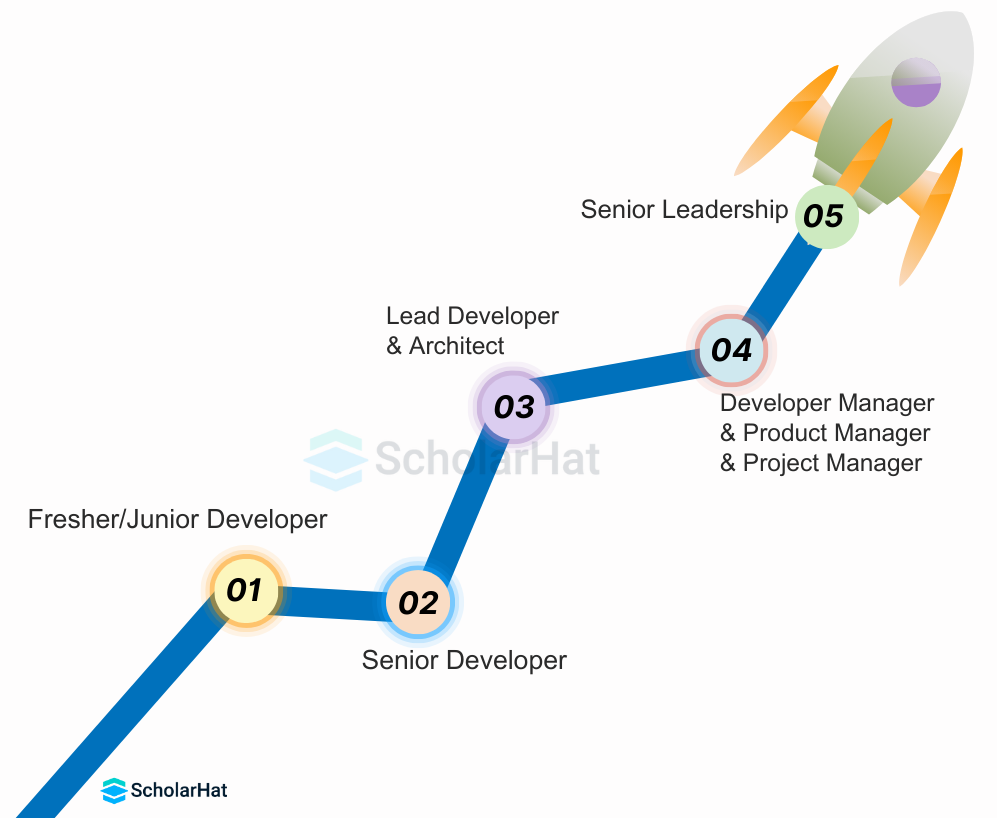
- Junior .NET Developer: They are entry-level professionals having foundational knowledge of the .NET framework and its associated technologies. They work under the guidance of senior developers, contribute to development tasks, and gain hands-on experience by working on projects.
- Mid-Level .NET Developers: They take on more complex tasks, design and implement features, collaborate with cross-functional teams, and contribute to the architecture and design decisions of software projects.
- Senior .NET Developer: They have extensive experience and expertise in .NET development, along with strong problem-solving and leadership skills. They lead development teams, mentor junior developers, and provide technical guidance and support.
- Technical Lead/Architect: These are senior-level professionals responsible for defining the technical vision, architecture, and design principles of software projects. They oversee the entire development lifecycle, collaborate with stakeholders to understand business requirements and guide the implementation of scalable and maintainable solutions.
- Development Manager/Director: They manage development teams, define project goals and priorities, establish best practices and processes, oversee resource allocation, budgeting, and project timelines, and ensure the successful delivery of software projects.
- Specialization and Advanced Roles: .NET Developers may choose to specialize in specific areas of .NET development, such as web development, mobile development, cloud computing, or data science. They may pursue advanced roles such as DevOps engineer, cloud architect, data engineer, security specialist, etc.
- Entrepreneurship and Consulting: Experienced .NET developers may explore entrepreneurship opportunities by starting their own software development companies, consulting firms, or freelance businesses.
Salary of a .NET Developer
So, when you decide to start your career as a .Net Developer, you need to know the Salary Structure for this role in the industry.
The average annual salary of a .NET Developer in India is Rs. 5.2 LPA.
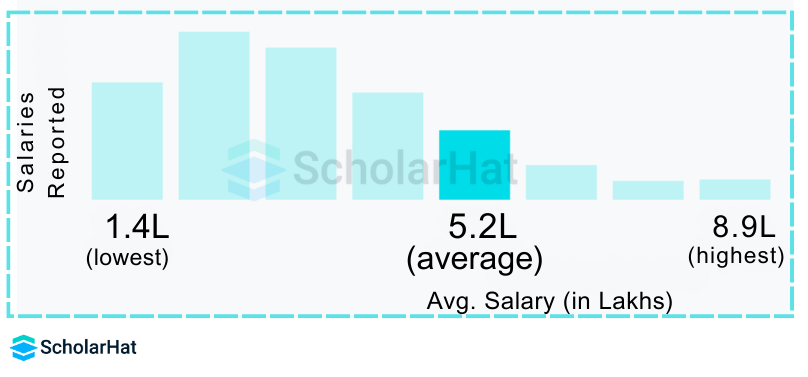
There are some factors on which the salary of a .NET Developer depends:
- Experience
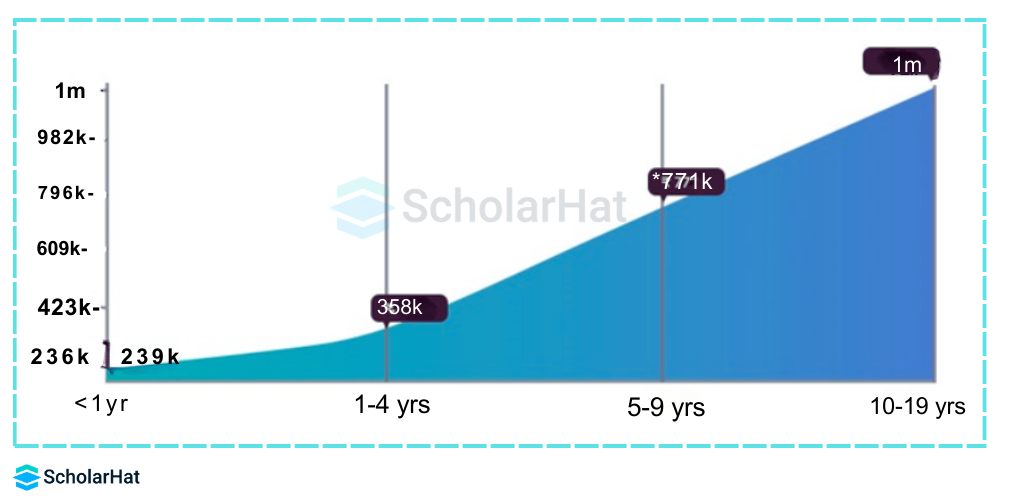
Data Source: https://www.payscale.com/research/IN/Job=.NET_Software_Developer_%2F_Programmer/Salary
- Location
Location Average Base Salary/year (In INR) Delhi ₹439,162 Mumbai ₹428,674 Kolkata ₹338,000 Hyderabad ₹415,746 Banglore ₹597,475 Data Source: https://www.payscale.com/research/IN/Job=.NET_Software_Developer_%2F_Programmer/Salary
- Employer
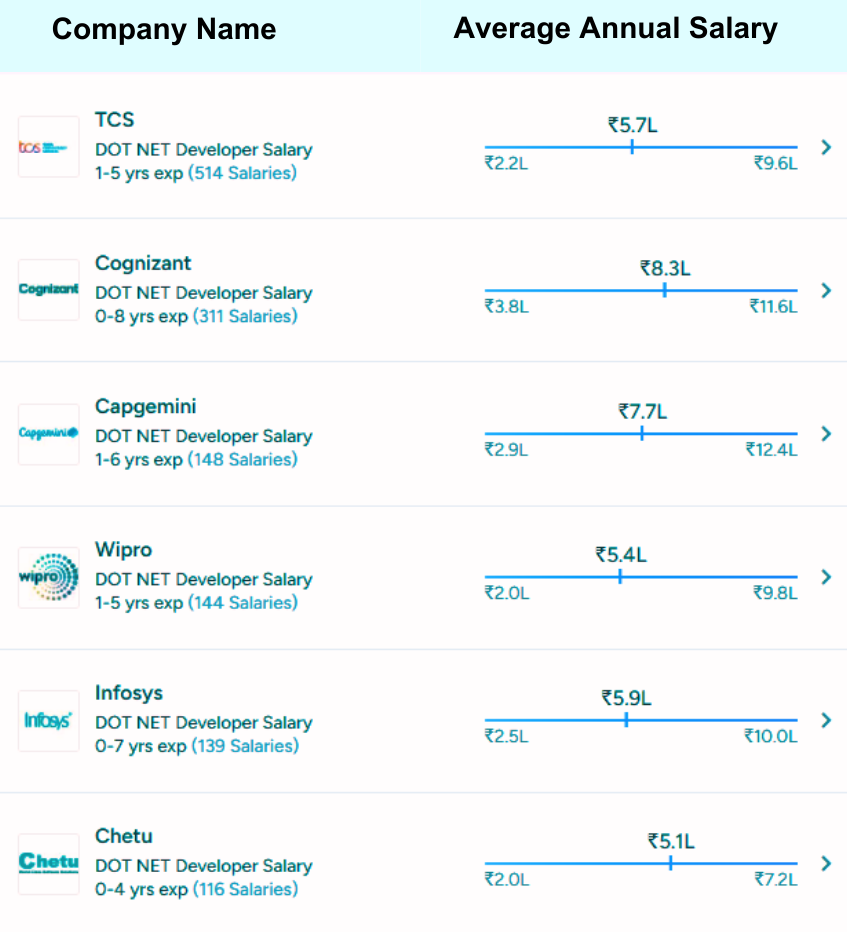
Data Source: https://www.ambitionbox.com/profile/dot-net-developer-salary
- SkillSet
Skill Set Average Base Pay/annum (In INR) C# ₹448,978 Microsoft SQL Server ₹435,032 ASP.Net Framework ₹422,328 Bootstrap ₹500,000 .Net Core ₹685,000 Data Source: https://www.payscale.com/research/IN/Job=.NET_Software_Developer_%2F_Programmer/Salary
Explore Salary Related Article:
Job Search and Career Development
Follow the below-given steps in your job search for a .NET Developer profile
- Update Your Resume: Tailor your resume to highlight your .NET development skills, relevant experience, projects, certifications, and achievements.
- Build Your Online Presence: Create a professional LinkedIn profile and keep it updated with your skills, experience, projects, and endorsements.
- Explore Job Boards and Career Websites: Use job search engines, career websites, and specialized platforms like Stack Overflow Jobs, GitHub Jobs, and LinkedIn Jobs to find .NET developer positions.
- Attend Networking Events: Attend local meetups, tech conferences, workshops, and networking events to connect with other .NET developers, recruiters, and hiring managers.
- Apply for Positions: Apply for .NET developer positions that align with your skills, experience, and career goals. Customize your cover letter and tailor your application to each job opportunity to demonstrate your interest and suitability for the role.
- Prepare for Interviews: Practice common interview questions, technical coding challenges, and whiteboard exercises relevant to .NET development.
Read more:
- .NET8 Developer Roadmap
- What is the difference between .NET 7 and 8?
- What's new in .NET 8? Discover ALL .NET 8 Features
- Why a Tech Stack .NET Developer Should Upskill?
- .NET Developer Should Learn Azure or AWS?
Summary
The above .NET Developer Roadmap for 2025 covers in a detailed manner the complete roadmap to becoming a .net developer from the perspective of a beginner and also an experienced one. It has highlighted every aspect of a .Net Developer's career path. Go through it before heading your journey as a .NET Developer.


